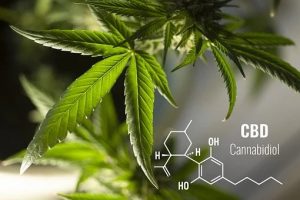Written by Joyce Smith, BS. Cannabidiol, an extract from Cannabis stevia, significantly reduced the frequency of convulsive seizures in the 52 participating children and young adults with Dravet syndrome.
 Cannabidiol (CBD) is a nonpsychoactive constituent of cannabis and one of many active cannabinoids identified in Cannabis sativa, commonly known as marijuana. Accounting for up to 40% of the plant’s extract, this major phytocannabinoid, along with other cannabinoids, have been studied for many different uses including Multiple sclerosis, Parkinson’s and Huntington’s diseases, dystonia, bipolar disorder, seizures, and schizophrenia 1.
Cannabidiol (CBD) is a nonpsychoactive constituent of cannabis and one of many active cannabinoids identified in Cannabis sativa, commonly known as marijuana. Accounting for up to 40% of the plant’s extract, this major phytocannabinoid, along with other cannabinoids, have been studied for many different uses including Multiple sclerosis, Parkinson’s and Huntington’s diseases, dystonia, bipolar disorder, seizures, and schizophrenia 1.
While many small studies have shown a potential benefit of cannabidiol for epilepsy patients, no randomized studies have been done to test this hypothesis. Dravet syndrome is a rare genetic form of epileptic encephalopathy that carries a high mortality rate. 2 Therefore, Devinsky et al, in a multinational, randomized, double-blind trial, 3 randomly assigned across 23 sites in the United States and Europe, 200 children and adolescents between the ages 2-18 years, all with Dravet Syndrome and uncontrolled, drug-resistant seizures to receive either CBD oral solution at a dose of 20 mg/kg of body weight per day or placebo over a 14-week period. All participants continued their existing daily epileptic treatment during this time.
A baseline of median seizure frequency (13 convulsive seizures) for all study participants was established during the 4 weeks prior to CBD or placebo intervention. This 4-week baseline period was followed by a 14-week treatment period with 52 patients receiving CBD and 56 receiving placebo.
The primary endpoint was determined as the change in convulsive seizure frequency over the 14-week treatment period when compared to the 4-week baseline period. A 7-point Caregiver Global Impression of Change (CGIC) scale measuring degrees of improvement, worsening, or no change became the secondary endpoint of the study. Seizure frequency was recorded by caregivers and clinical laboratory assessments were done at baseline and after 2, 4, 8, and 14 weeks.
Results over the entire treatment period showed a significant decrease in the primary endpoint of convulsive seizure per month from a median of 12.4 to 5.9 in the CBD intervention group compared to a decrease of convulsive seizures from 14.9 to 14.1 in the placebo intervention group (P=0.01). In addition, 43% of the cannabidiol patients had at least a 50% reduction in convulsive seizure frequency compared to 27% of those in the placebo group (P=0.08). Frequency of total seizures of all types was also significantly reduced in the cannabidiol group (P=0.03) compared to no significant reduction in nonconvulsive seizures.
While this trial demonstrated a reduction in frequency of convulsive seizures in children with Dravet syndrome, it also presented side effects such as somnolence and elevated liver enzyme levels.
Dr. Devinsky, the lead investigator, believes ‘Cannabidiol should not be viewed as a panacea for epilepsy, but for patients with especially severe forms who have not responded to numerous medication, these results provide hope that we may soon have another treatment option.’ He recommends randomized controlled trials to provide further evidence of “cannabidiols effectiveness as a medication for treatment –resistant epilepsy. “
Source: Devinsky, Orrin, J. Helen Cross, Linda Laux, Eric Marsh, Ian Miller, Rima Nabbout, Ingrid E. Scheffer, Elizabeth A. Thiele, and Stephen Wright. “Trial of cannabidiol for drug-resistant seizures in the dravet syndrome.” New England Journal of Medicine 376, no. 21 (2017): 2011-2020.
© 2017 Massachusetts Medical Society
Posted July 18, 2017.
Joyce Smith, BS, is a degreed laboratory technologist. She received her bachelor of arts with a major in Chemistry and a minor in Biology from the University of Saskatchewan and her internship through the University of Saskatchewan College of Medicine and the Royal University Hospital in Saskatoon, Saskatchewan. She currently resides in Bloomingdale, IL.
References:
- Plus M. Cannabidiol. https://medlineplus.gov/druginfo/natural/1439.html. Accessed July 17, 2017, 2017.
- Porter BE, Jacobson C. Report of a parent survey of cannabidiol-enriched cannabis use in pediatric treatment-resistant epilepsy. Epilepsy & Behavior. 2013;29(3):574-577.
- Devinsky O, Cross JH, Laux L, et al. Trial of cannabidiol for drug-resistant seizures in the dravet syndrome. New England Journal of Medicine. 2017;376(21):2011-2020.
